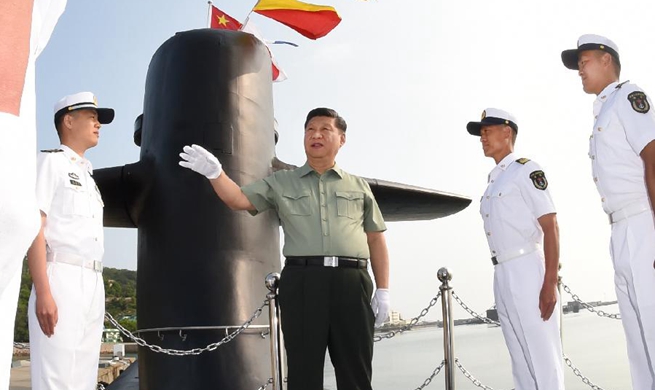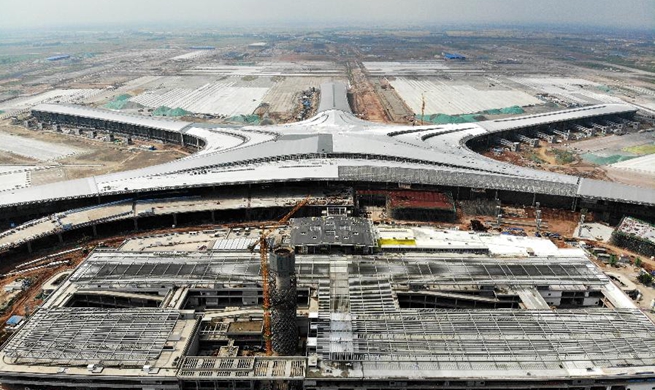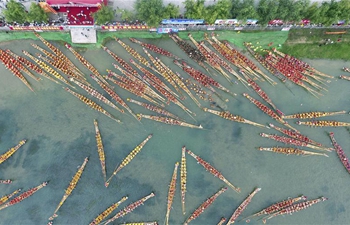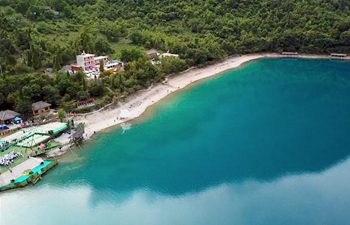by Murad Abdu
ADEN, Yemen, June 15 (Xinhua) -- As the Yemeni government forces are making significant progress in their battles against Iran-backed Shiite Houthis over the control of the western port city of Hodeidah, analysts said retaking the city will terminate the rebels' financial and military assistance from other countries.
The Yemeni forces, supported by the United Arab Emirates (UAE), reached the Hodeidah International Airport on the outskirts of the city early Friday, under the cover of heavy aerial bombardment from Saudi-led warplanes.
The Yemeni government sees the battle to retake Hodeidah and its port as the key to liberating the country from the grip of Houthis, which will mark the beginning of the rebels' fall and secure navigation in the Bab el-Mandeb Strait.
The Saudi-led coalition also accuses Houthis of using the port to threaten international navigation with direct attacks on ships and to smuggle ballistic missiles primarily from allied Iran.
AlKhader Almaysary, a political writer and analyst based in Aden, said Hodeidah is of great geopolitical significance and seizing it will dampen Houthis' power and "break their bones."
"Apparently Iranians left Houthis to face their bitter fate alone. Houthis will be suffocated in their northern regions with no financial support," Almaysary noted.
Meanwhile, the recapture of Hodeidah will also pave the way for liberating other northern and central provinces controlled by Houthis, including the capital Sanaa, which has been under the rebels' control since late 2014.
"Houthi fighters and field commanders in other northern provinces will face psychological effects after losing Hodeidah because it is considered their main financial source," said Abdul-Raqeeb al-Hidyani, a political analyst.
The turning point will "create a huge military pressure on Houthis, who will lose control over territory day after day," he added.
For Hassan Alsubihi, a military analyst, the fate of Hodeidah is closely linked to how long the internal military conflict will persist in Yemen.
"Houthis have to decide to either accept participation in the negotiations and reach a political solution, or continue in fighting till the end. There is no other choice and they should accept the first choice as that's more logical," Alsubihi said.
"More than 85 percent of Yemen's territory is out of Houthis control and they know well that their forces will lose the battle sooner or later," he added.
In recent days, the government forces with direct support from the Saudi-led coalition intensified the battles against the Houthis in Hodeidah and managed to retake key areas in the port city.
Yahya Abu Hatim, a Yemeni military observer, agreed that Houthis have no more chance in Hodeidah as "they only depend on planting thousands of landmines and using local citizens as human shields."
"Houthis exploited this city and deprived the citizens from their basic rights. It's time to rescue the poor people from malnutrition and diseases caused by Houthis' rule," Hatim noted.
Strategically situated on the Red Sea coast, Hodeidah, Yemen's fourth largest city with a population of 400,000, is the only major port city under Houthis' control.
The Hodeidah port, which the Iranian-backed Houthis captured from Yemen's internationally-recognized government in October 2014, serves as a key source of strength for Houthi militias because it is regarded as a lifeline for many Yemenis.
According to the United Nations, Yemen has the world's largest humanitarian crisis since 1945 with two thirds of the population, or 19 million, in need of humanitarian assistance.
The UN warned that the battles to liberate Hodeidah, which has the highest poverty and malnutrition rates in war-torn Yemen, could kill 250,000.
In a press statement on Thursday after an emergency closed-door meeting, the UN Security Council expressed "deep concerns about the risks to the humanitarian situation" following the launch of an offensive against Hodeidah by the Saudi-led coalition.
It reiterated that the political solution is the only way to end the three-year conflict in the Arab country.
Ali bin Hadi, a Yemeni politician and observer, said the "helpless" civilians in Hodeidah "cannot afford the skyrocketing transport cost to escape" and "might be harmed in random shelling."
"The majority of people depend on one daily meal and cannot endure one month of fighting and shelling in their city," he added.
The Yemeni government, however, reassured that it will restore normal life in all 26 districts of Hodeidah with the support of the Saudi-led Arab coalition after liberating the city.
According to a report issued by Chatham House, a London-based independent policy institute, the Houthis get as many as 30 million U.S. dollars a month in port revenues, but Yemeni officials say all of them go to fund the civil war without trickling back to state institutions.















